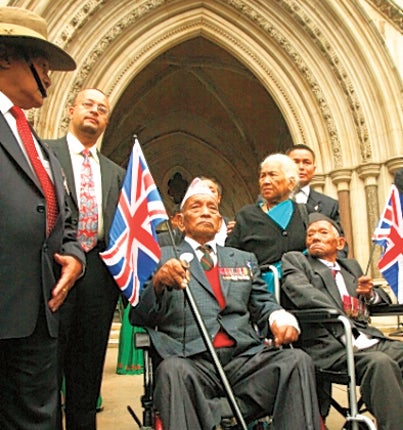Cherie Booth rejects claims she made money from Gurkhas
Former prime minister's wife worked for 'less than half her normal fee'

Tony Blair's wife has denied claims that she had charged large sums of money for representing Gurkha veterans in legal cases. Cherie Booth QC said she had received a total of £4,600 from the former soldiers for work undertaken to ensure that they got legal aid for a case against the British government.
Ms Booth told The Independent that she had worked for the Gurkhas for less than half her normal fee for a year. She pointed out that there was "no automatic entitlement" to legal aid and that the "Legal Services Commission had ruled that Gaeso [Gurkha Army Ex-Servicemen's Association]... were required to pay a contribution, 25 per cent, of their legal costs themselves."
Ms Booth was responding to allegations by a Gurkha welfare group based in Nepal that she and Phil Shiner, a prominent civil rights lawyer, had "made money" out of the Gurkhas even though legal aid was awarded for the case.
Padam Bahadur Gurung, the president of Gaeso, had said: "Gurkhas were still required to pay Cherie Booth, Phil Shiner and [former Gaeso legal advisor] Siwakoti's legal fees... Indeed, there is a letter from Phil Shiner which states that Gaeso were required to pay an outstanding £147,230.78."
Mr Shiner had pointed out that as well as the contribution required from Gaeso, his invoice also covered other work he had done for Gaeso and "every single pound, every single penny" was accounted for.
Mr Gurung and his associates are themselves enmeshed in controversy over former soldiers being charged cash for advice on settling in the UK when such advice is freely on offer at an office set up by the British government in Nepal.
A spokeswoman for Ms Booth had initially said the QC had only received her legal aid fees for representing Gurkha veterans seeking better pay and pensions from the Ministry of Defence in 2003. However, Ms Booth later acknowledged the payment of £4,600 in preliminary work.
A statement said: "Cherie Booth QC was paid a total of £4,600 by the Gurkhas for her work, some of which was to enable them to claim legal aid, to which there is no automatic entitlement. She worked for them for less than half her normal fee for over a year, before other barristers and solicitors took over.
"Fortunately, the Legal Services Commission did agree to grant the Gurkhas legal aid but because Gaeso represented such a large number of Gurkhas, most of whom were in receipt of the Gurkha pension, the Commission ruled that they were required to pay a contribution [25 per cent] of their legal costs themselves."
At the time Nepalese officials complained about the "message being sent by the British Prime Minister's wife being involved in a politically sensitive case". However, Ms Booth was also praised by civil rights groups for not using her marital situation to avoid appearing at legal proceedings which would be potentially embarrassing for the Government.
Join our commenting forum
Join thought-provoking conversations, follow other Independent readers and see their replies
Comments